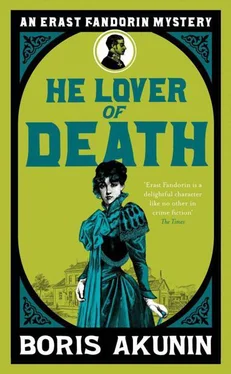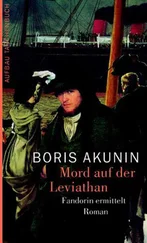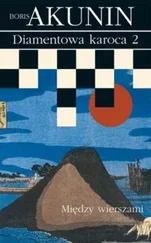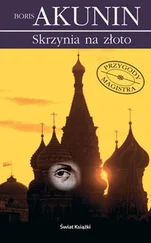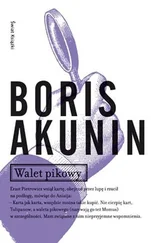The little kid was walking out of the market in a sailor suit. He had a red-faced woman with him – his nanny or someone like that, carrying a basket. She’d obviously just been to market to do her shopping, and the master’s little boy had tagged along.
The woman said: ‘If he’s crying, he must have troubles. He wants to eat.’
And she dropped a coin into his cap on the ground – fifteen kopecks, plonk.
Senka looked at that coin and started wailing even louder. He felt really hard done by now.
Suddenly there was a clang – another coin, five kopecks this time. An old woman in a shawl had thrown it. She made the sign of the cross over Senka and walked on.
He picked up the alms, and was about to dash off and buy some pies or some buns, but then he changed his mind. So he’d stuff his belly with a couple of buns, and then what? If he could collect three or four roubles, he could buy himself a jacket, and then maybe he could change a petrusha.
He squatted down on his haunches and started rubbing his eyes with his fists, not real hard, just enough to give them a pitiful look. And what do you think? The Christian people took pity on the weeping beggar. Senka had sat there for less than an hour before he had collected a whole heap of coppers. A rouble and a quarter, to be precise.
He sat there, blubbing and reasoning philosophically: When I didn’t have half a kopeck to my name, I still didn’t go begging on the street, and now look at me. That’s what you get for being rich. And it says that in the gospels too, the people who have riches are the greatest paupers of all.
Suddenly Senka was whacked hard across the tailbone. It hurt. He turned round and there was a beggar with a crutch, who yelled: ‘Oh, the ravening beasts! Oh, the jackals! Stealing someone else’s bread! My place, since time out of mind! Can’t even go away to get some tea! Give it back, whatever you’ve taken, you little thief, or I’ll call our lot!’
And he bashed Senka with the crutch, again and again.
Senka grabbed the cap, almost spilled his booty, then ran off, out of harm’s way. He didn’t want to mess with beggars – they could easily beat you to death. They had their own council and laws.
He walked across Resurrection Square, trying to think of the smartest way to spend a rouble and a quarter.
And then he was shown the answer.
A messenger boy came darting out of the Grand Moscow Hotel, in a short little jacket with the gold letters ‘GMH’, and a cap with a gold cockade on it. The lad was clutching a three-rouble bill – one of the guests must have asked him to buy something.
Senka overtook the messenger and struck a deal to hire the tunic and cap for half an hour. As a deposit, he tipped out all the change he’d scrounged at the market. And he promised to pay twice as much again when he got back.
Then off he ran to the Russo-Asian Bank.
He stuck a five-hundred note through the little window and said the words as if he was in a rush: ‘Change this for four hundreds, and give me the other hundred in small notes. That’s what the guest asked for.’
The cashier shook his head respectfully. ‘Well, they certainly have trust in you over at the Grand Moscow.’
‘That’s because we’ve earned it,’ Senka replied with dignity.
The bank clerk checked the number of the note against a piece of paper – and handed back exactly what he’d been asked for.
Well, after that, when Senka had dressed up in clean clothes and got a fashionable haircut at the ‘Parisian’ salon, the rich life began to treat him better.
Story Two. About life in society, at home and at court
His means were quite adequate to allow him to move into the Grand Moscow Hotel, and Senka got as far as the doors, but then he looked at the electric lamps, the carpets, the lions’ faces over the windows, and he lost his nerve. Well, naturally, Senka was dolled up like a real gent now, and there were lots of other expensive duds, still unworn, folded in his brand-new suitcase, but hotel commissionaires and flunkeys were a fly lot, they’d spot a Khitrovka mongrel under his cheviot and silk straight off. Just look at that general with gold epaulettes they had behind the counter. What would Senka say to him? ‘The most excellent room that you’ve got, please’? And the general would say: ‘Where do you think you’re going, sticking your swinish snout in the bread bin?’ And what was the proper way to approach him? Should he say hello or what? Should he take his cap off? Maybe he should just tip it, the way gents did to each other in the street? And then, weren’t you supposed to tip them all in a hotel? How could you hand a tip to someone as grand as the general? And how much? What if he just flung Senka out and took no notice of the swish Parisian haircut?
Senka loitered in front of the door for a long time, but he couldn’t build up the courage.
Only this set him thinking. Wealth wasn’t a simple thing – that much was clear. It needed special study.
Of course, Senka found a place to live – this was Moscow after all, not Siberia. He took a cab at Theatre Square and asked after a handy place for a visitor from out of town to stay, somewhere decent and proper. And the cabby delivered him like the wind to Madam Borisenko’s on Trubnaya Street.
The room was wonderful, Senka had never lived in anything like it before. A great big room with white curtains, a bedstead with bright shiny knobs, and a feather mattress on the bed. In the morning he was promised a samovar with doughnuts and in the evening, dinner if required. Servants did all the cleaning, and in the collidor there was a washbasin and a privy – not quite like Death’s privy, of course, but it was clean, you could sit and read a newspaper in it. A right royal mansion, in other words. True, it cost a fair bit, thirty-five roubles a month. By Khitrovka standards that was crazy money –you could stay there for five kopecks a night. But if you had almost two thousand roubles in your pocket, it didn’t seem so bad.
Senka settled in, admired his new things, laid them out, hung them up, sat down by the window and looked out on the square. He had to do some thinking about his new life in this world.
It’s a well-known fact that every man turns his nose up at his own lot, and envies other people’s. Take Senka. He’d dreamt of riches all his life, though he knew in his heart he’d never have any. But the Lord above sees all things, He hears every prayer. Whether He’ll grant them all is a different matter altogether. The Almighty has His own reasons, beyond the ken of mortal men. One of the lame cripples who wander the earth once said: The most grievous test the Lord can set is to grant you all your wishes. There you go, dreamer, choke on that. Weren’t you coveting too much? And what are you going to covet now?
And that was how it happened with Senka. God was asking him: ‘Did you really want earthly treasures? Well, here’s some treasure for you – now what?’
Life without money is rotten – no two ways about it – but even with riches, it’s not all as sweet as honey.
So Senka had stuffed his paunch – he’d gobbled down eight pastries in the confectioner’s shop, and got belly cramps for his trouble. He’d dressed himself up and got beautiful lodgings, but what came next? What will you wish for now, Semyon Trofimovich?
But Senka’s state of philosophical melancholy (brought on by those pastries) didn’t last very long, because his dreams took shape of their own accord. He had two: one for earth and one for heaven.
The earthly dream was about turning riches into even greater riches. They named you Speedy, now show some nous, use your noggin.
Any fool could see that if you dragged all the silver sticks in that vault out into the open, no one would buy them except by weight. Where would you find enough numismatists to take them all, one stick each?
Читать дальше
